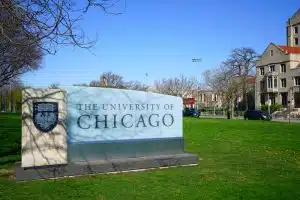Gaining admission to an Ivy League school is a challenging and competitive process that requires a combination of academic excellence, extracurricular achievements, and strategic planning. At AdmissionSight, we take a holistic and comprehensive approach to guide our students on how to get into an Ivy League school.
To get into an Ivy League school, you need to achieve excellent grades and strong SAT scores, and take a rigorous course load of AP exams. In addition, you need standout extracurricular activities and academic competitions to get in. Our Chances Calculator will give you a broad and rough back of the envelope calculation on what your odds of admission are to the Ivy League and other top universities.
Here are some general steps you might consider on how you get into an Ivy League School:
1. Earn at least a 3.9 unweighted or 4.0 GPA, particularly in challenging courses of AP or IB courses.
We typically want to see an applicant who has gotten at least a 3.9+ unweighted GPA. The weighted GPA will depend on the course rigor and the number of AP and honors courses taken.
Anything over 5 AP courses gets you AP Scholar with Distinction, which is typically the top 10-15% of students in the country. Anything over 8 AP’s gets you National AP Scholar, an award that has now been discontinued but in the past signaled the top 1% of students in the country.
You may take our GPA calculator to determine your unweighted and weighted GPA.
2. Get at least a 1550+ on the SAT’s, or a 35+ on the ACT’s.
Prepare for and excel in standardized tests like the SAT or ACT. Consider taking these tests more than once to improve scores, and generally no more than 2-3x.
While the UC’s no longer accept SAT’s and many schools have gone test-optional at this point, it’s still an important factor to consider. An applicant with a 1550+ SAT’s is still better than an applicant who applies test-optional in our view.
3. Take a rigorous course load of at least 5 AP Exams to get AP Scholar with Distinction, or 8 AP exams for Top 1% in the country.
In the past there was an award called the National AP Scholar, which has since been discontinued. But the National AP Scholar essentially represented the top 1% of students in the country who were able to take 8 AP Exams before the end of junior year. We recommend taking at least 5 AP Exams by the end of junior year to remain competitive.
4. Engage in extracurricular activities that demonstrate leadership, commitment, and academic passion.
What are you excited about or interested in? Are you interested in computer science or philosophy or chemistry? If so, how do you leverage these academic passions in your extracurricular pursuits to tackle a social mission or cause?
We want to see how you use your academic passions outside of the classroom, whether it’s to tackle environmental sustainability or healthcare policy. For example, one of our computer science students collected and made audio recordings of autistic children that feed into machine learning algorithms to help improve speech impairment!
Ideally, you want to get leadership positions through your extracurricular efforts, whether it’s starting a nonprofit organization or joining school clubs, or doing volunteering efforts to demonstrate how you benefit your community.
5. Conduct Academic Research
Academic research plays a pivotal role in the college admissions process, serving as a critical indicator of a student’s readiness for higher education. Engaging in research projects allows students to demonstrate their intellectual curiosity, analytical skills, and dedication to a specific field of study.
It demonstrates a student’s ability to conduct in-depth investigations, manage complex information, and synthesize findings into coherent conclusions. Moreover, academic research experience often contributes to a more compelling application, setting students apart in a competitive admissions landscape.
It signals to admissions committees that the student is not only academically proficient but also proactive in pursuing knowledge beyond the classroom. This commitment to scholarly inquiry often translates into a greater likelihood of success in college, where independent research and critical thinking are integral to academic achievement.
6. Attend Prestigious Summer Programs
Summer programs are a hidden gem in the college admissions playbook. Whether it’s diving into academic subjects, or showing colleges that you’re the kind of student who turns summer break into a launchpad for success, summer programs can be highly beneficial.
Imagine a high schooler spending their summer at the Stanford University Mathematics Camp (SUMaC), tackling complex math problems that most college students wouldn’t dare to touch. Or picture a budding engineer at MIT’s Research Science Institute, turning theoretical knowledge into real-world solutions. These programs do more than pad your resume; they scream ambition, intellectual curiosity, and the willingness to challenge yourself.
For an admissions officer sifting through thousands of applications, a student who spent their summer at, say, the Iowa Young Writer’s Workshop, engaging in college-level seminars, isn’t just another applicant. They’re a go-getter, a future leader, a young mind already sprinting towards higher learning. That’s the power of a summer well spent.
3. Volunteer and Service
In the world of college admissions, volunteering and community service play a significant role in an applicant’s overarching profile. Imagine an applicant who spends weekends at the local animal shelter, not just playing with pets but also organizing fundraising events.
This shows colleges a heart for service and leadership skills in action. Or consider a high schooler leading a community clean-up initiative, rallying peers to care for their environment. Such actions speak volumes about a student’s commitment to making a positive impact. Colleges also take notice of students involved in programs like Habitat for Humanity, where they literally help build communities, or those participating in overseas missions, indicating a global perspective and empathy.
These experiences paint a picture of a student who doesn’t just want to learn from the world but also wants to contribute to society, signaling that they’ll bring the same dedication to campus life and beyond.
4. Gain Regional or National Recognition in Academic Competitions
Academic competitions like the Intel Science and Engineering Fair and the Scholastic Art and Writing Competition are crucial for aspiring young minds, as they provide a platform for students to showcase and enhance their skills in science, technology, engineering, arts, and writing.
These contests encourage deep engagement with subject matter, fostering critical thinking, creativity, and problem-solving skills. They offer valuable opportunities for recognition, networking, and potential scholarships, often serving as a springboard for further academic and career advancements.
Participating in such competitions not only bolsters college applications but also instills confidence and a sense of achievement among students, preparing them for future challenges in their educational and professional journey.
5. Personal Statements and Supplemental Essays
Personal statements and supplemental essays are crucial components of the college admissions process, serving as a window into the applicant’s personality, values, and life experiences. Unlike test scores and grades, which provide a quantitative measure of academic ability, these essays offer a unique opportunity for students to convey their voice, aspirations, and individuality.
A well-crafted personal statement can illuminate a student’s character, resilience, and how they have navigated and grown from personal challenges or experiences. Supplemental essays, on the other hand, allow students to demonstrate their specific interest in a college, showcasing why they are a good fit for that particular institution and how they plan to contribute to it.
These essays are a chance to stand out in a pool of similarly qualified candidates by sharing compelling stories or insights that can resonate with admissions officers. Ultimately, personal statements and supplemental essays can tip the balance in favor of the applicant, transforming them from a set of numbers and achievements into a memorable and dynamic individual.
6. Letters of Recommendations
Letters of recommendation are a vital component of college admissions, offering a third-party perspective on a student’s abilities, character, and potential. These letters, typically written by teachers, counselors, or mentors, provide insights that grades and test scores cannot capture.
They highlight a student’s intellectual curiosity, work ethic, resilience, and how they interact with peers and educators. A glowing recommendation from a teacher can underscore a student’s passion for a particular subject, while a mentor’s letter might reveal their leadership and initiative outside the classroom. These endorsements help admissions officers paint a fuller picture of the applicant, not just as a student, but as a community member and future contributor to the college environment.
Effective letters of recommendation often share anecdotes and specific examples that bring a student’s qualities to life, making them more than just an applicant, but a promising individual with unique attributes and potential.
7. Interview Preparation
The college interview, often an overlooked aspect of the admissions process, plays a crucial role in shaping an applicant’s profile. Preparing for the college admissions interview is essential as it allows students to directly convey their personality, passion, and suitability for the college.
An interview allows a student to articulate one’s experiences, achievements, and future aspirations, providing depth to the application and a chance to leave a lasting impression. Effective preparation involves researching the college’s ethos and programs, reflecting on personal experiences, and practicing responses to typical interview questions.
This not only increases confidence but also enables students to present themselves in a coherent and articulate manner. Mastery of the interview process demonstrates a student’s commitment and genuine interest in the institution, potentially tipping the scales in a competitive admissions environment.
Ultimately, well-prepared interview responses can transform an applicant from a collection of grades and achievements into a compelling, well-rounded candidate who is a perfect fit for the college.
8. Come up With an Effective School List
Apply early decision/action if you have a clear first-choice school, as this can sometimes increase your chances. Apply to a range of schools, including non-Ivy League schools, to ensure you have options in front of you.
At the end of the day, the college admissions process is a numbers game and if you don’t apply, you effectively have a zero percent chance of getting in. So do apply to as many schools as you can fit – the Common Application accepts up to 20 applications, and the Coalition application can accept many more.
9. Demonstrate Interest
Visit campuses, attend college fairs, and engage with admissions officers to demonstrate your interest in the school. This is a minor point, but worth considering. The best time to visit colleges is the summer after junior year.
This is even more important if you’re an athletic recruit, in which case you need to establish relationships with coaches early on, typically after June 15 of your sophomore year.
Remember, while Ivy League schools are prestigious, the best college for you is one where you will be happy, challenged, and able to achieve your personal and professional goals. Take a look at our blogs on how to get into prestigious Ivy League and top universities in our country.
- How to Get into Harvard
- How to Get into Princeton
- How to Get into Yale
- How to Get into Columbia
- How to Get into Dartmouth
- How to Get into Brown
- How to Get into Cornell
- How to Get into UPenn
Other top schools to consider:
Gaining admission to an Ivy League school demands more than academic excellence. It requires a holistic approach: outstanding grades and test scores are essential, but so is demonstrating leadership, creativity, and commitment through extracurriculars and community service.
A well-crafted personal statement and strong letters of recommendation are crucial to add depth to your profile. Effective interview preparation can further highlight your suitability for these elite institutions. Ultimately, success in Ivy League admissions hinges on presenting a well-rounded, authentic application that aligns with the school’s values and stands out among a highly competitive pool of candidates.





































